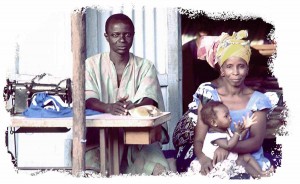 From: Tubob: Two Years in West Africa with the Peace Corps
From: Tubob: Two Years in West Africa with the Peace Corps
The only place we could buy ready-made clothes was in The Gambia’s capitol city, Banjul, so most of my dresses were made to order at nearby Basse. Because of the heat, I preferred loose-fitting dresses and our local tailors were adept at copying a dress pattern from another sample dress, taking measurements of my shoulders and the preferred dress length. I was impressed with the tailors. Interestingly, they always were men. They used foot-operated treadle machines as there was often no electricity in the market place.
Our favorite tailor, Dawda, set up his business at the Basse market, in front of a Mauritanian-owned fabric store. He happened to be the first tailor I went to with one of my friend’s dresses to use as a sample.
Dawda understood the concept of learning. He always had a spare chair next to him and often invited me to sit and we’d chat in Mandinka. At first he talked slowly so that I could understand and often gave me new words that I could use. He was a wonderful man and very skilled on his treadle sewing machine.
I had a large selection of thread sent from the States for Dawda and he was thrilled. The thread that tailors often used was quite breakable, so he was pleased to have strong polyester thread. He had a scrap of material left over from another project and one day while we chatted, he made a triangular head scarf for me, using his new thread.
By this time we could converse fluently and I asked him about a bulubah, a sort of robe, for my husband Bruce. His eyes lit up. “Most tubobs don’t even know what a bulubah is,” he said. We went into the fabric store together to find suitable fabric, something that would look good with Dawda’s wonderful machine embroidery.
The blue and gold garment would come down to Bruce’s ankles, with loose, flowing sleeves and would serve as a robe in the evenings. It would be my Christmas present to him.
Tourist season had started and would continue through February. We occasionally saw tubobs wandering around the market. They were usually so pale, Bruce and I jokingly referred to them as “cadavers.” Most of them arrived by the weekly boat Lady Chilel, slept onboard and were gone when the boat headed back downriver the next day.
A tourist couple stood by while Dawda and I talked. “Listen,” the woman said, “she’s talking their language.”
Dawda and my eyes locked. We totally ignored them.


What a wonderful, positive experience. I can imagine how much Dawda appreciated the thread and also visiting in his language!
The Gambians were always so appreciative of things like that. They had so little money plus such limited product availability, what is a given to us is such a treat for them.
Yes, you were ‘talking their language’ and that made such a difference.
Yes, it did make a difference. It was such a relief when I could speak Mandinka fluently.